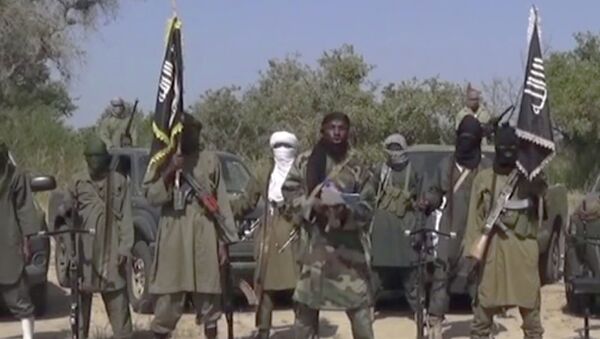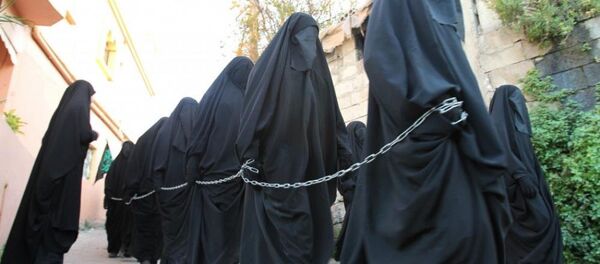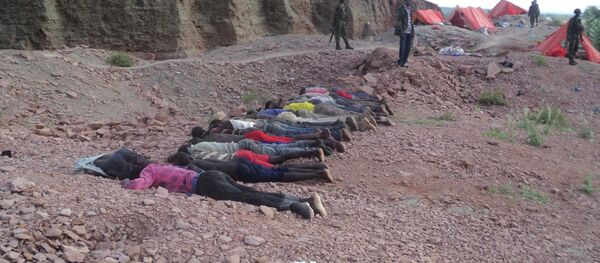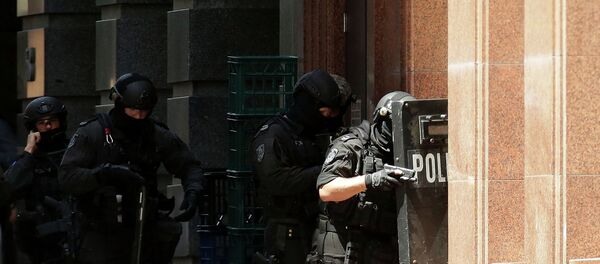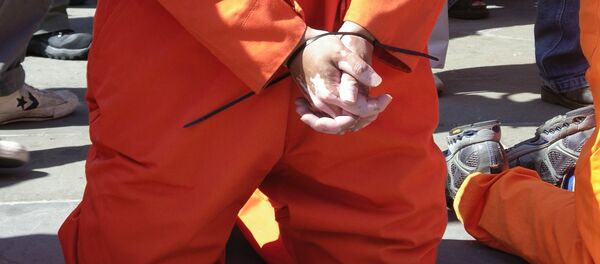MOSCOW, December 24 (Sputnik) — With the Islamic State militant group gaining ground in the Middle East, and old terrorist threats remaining, the outgoing year has seen a high number of violent attacks committed not only by militant groups, but also by radicalized individuals in various regions of the world.
Islamic State
A number of terror attacks committed by the group in 2014 took place in the two countries.
In January, a suicide bombing at a military recruiting center in Baghdad left more than 20 people dead and over 30 injured. Other major attacks by ISIS militants were a suicide car bombing in Jarabulus, in northern Syria, and an attack on the Ministry of Transportation building in Baghdad in January; car bombings in the Syrian northern province of Aleppo in February and in Baghdad's Saidiyah neighborhood in November.
Islamic State group is believed to be particularly dangerous due to its advanced tactics as compared to other terrorist groups. As Jessica Lewis, a researcher at the Institute for the Study of War noted in her "The Islamic State: a Counter-Strategy for a Counter-State," ISIS is not just a mere terrorist organization, but resembles an army in the way it operates, seizing land and establishing an ideological rule.
Taliban
Among the major attacks committed by Taliban in 2014: a suicide bombing in a restaurant popular among foreigners in Kabul, a bomb attack by Pakistani Taliban on a military convoy in Bannu, northwestern Pakistan, followed by a suicide bombing at a market close to the headquarters of the Pakistani military in January. In February Pakistani Taliban attacked a police facility in Kohat city, northern Pakistan. In late November, a suicide bomber killed dozens of civilians during a volleyball game in the southeastern Afghanistan province of Paktika.
In late December Pakistan saw by far the deadliest attack in 2014, when Taliban gunmen attacked a school in Pakistan's Peshawar city and killed over 140 people, most of them children. The Taliban later claimed that the attack was made in retaliation for the recent advancement of Pakistan's armed forces against the extremist group.
In 2014 Taliban considerably increased its activity, as foreign troops are departing from Afghanistan after 13 years of presence in the country. According to the United Nations, 2014 has been the deadliest year for civilians in Afghanistan since 2009. The UN mission in the country has documented a rising number of civilian casualties and an increased use of improvised explosive devices.
Al-Qaeda
In March, Sunni insurgents linked to al-Qaeda blew up a mini-bus in the Shia town Hilla, southern Iraq, killing more than 40 people. In June, al-Qaeda fighters attacked an airport in Seiyun, Yemen, and in December another attack in Seiyun saw a bomb explode in a square near a local government building.
In December, at least 25 people were killed in Radaa city in Yemen in two car bomb attacks intended for Houthi militants. The city of Radaa has been the center of fighting between Shia Houthis, the main opposition force in Yemen, and insurgents of al-Qaeda in the Arabian Peninsula.
Boko Haram
In January, a Boko Haram militant detonated a bomb in a crowded center of Maiduguri, capital of the Borno state in northeastern Nigeria. The group is also suspected of carrying out a massacre in Izghe, a village in the Borno state, in February that left more than 100 dead. Later in the month the group killed almost 60 students in a boarding school in Buni Yadi.
In April, the group killed more than 70 people during a bus station bombing in Abuja. However, the most violent attack by the group took place later in April, when Boko Haram kidnapped 276 schoolgirls from Chibok village and subjected them to physical, psychological and sexual abuse.
In May, more than 100 people were killed in attacks attributed to Boko Haram. Two bomb explosions occurred, one at a market and the other at a bus station in Jos, in central Nigeria.
In December, Boko Haram kidnapped 185 women and children and killed more than 30 people in an attack on Gumsuri, an isolated village not far from Chibok. In late November, several bomb explosions near the central mosque in the Nigerian city of Kano claimed the lives of more than 120 people.
Boko Haram's atrocities have become the primary threat in a number of Sahel countries where the militant group recruits newcomers among the refugee populations. The African Union Peace and Security Council at its November 25 meeting on Boko Haram called on the Security Council to provide support to Benin, Cameroon, Chad, Niger and Nigeria in a Multinational Joint Task Force to combat the extreme fundamentalist Islamist threat.
Al-Shabab
In 2014 al-Shabab committed a number of attacks in Somalia: explosions targeting a convoy of UN vehicles in Mogadishu in February and December; an explosion outside a hotel in the capital in January; an attack on the presidential palace complex in February that killed security officials including the chief of staff for the country's prime minister; and an explosion at a tea shop frequently visited by government employees. Moreover, al-Shabab claimed responsibility for the attack in Mpeketoni, Kenya, in mid-June, saying it was originally a Muslim area.
Other attacks
In May, more than 30 civilians were killed by separatists of the Bodo ethnic group in northeastern India (Baksa and Kokrajahar districts). The group accuses the local Muslim population of entering India unlawfully from Bangladesh.
In September, at least 50 people died in a series of explosions in the Xinjiang Uyghur Autonomous Region of China.
In October, a double terrorist attack in Homs, western Syria, took the lives of almost 40 people, including 30 schoolchildren.
Two attacks took place in the Russian republic of Chechnya. In early October a suicide bomber detonated himself in Grozny, where a concert devoted to City Day was scheduled. In early December, three cars driven by armed militants attacked a road patrol station in Grozny.
Lone wolf
In Quebec in late October, radicalized Canadian Martin Rouleau struck two soldiers with his car, killing one and injuring the other. Two days later, a lone gunman Michael Zehaf-Bibeau shot dead a soldier guarding the National War Memorial in Ottawa.
In December, 17 people were taken hostage by a man who declared himself to be an Iranian sheikh at the Lindt Cafe in Martin Place in Sydney. Three people, including the gunman, were killed and four injured when the police stormed the cafe to end 16 hour siege.
Lone-wolf attacks can be viewed in the context of the Western fight against Islamic State. Both Canada and Australia participate in the US-led coalition, which is currently carrying out airstrikes against Islamic State positions in Syria and Iraq.
Response
Following the attacks in Quebec and Ottawa, the Canadian government proposed legislation that would enable its intelligence service to conduct terrorism investigations abroad.
Following the incident in Sydney, Australia's Prime Minister Tony Abbott announced that the terror threat remained high. The chairman of the Parliament's joint committee on intelligence and security Anthony Byrne claimed that the terror threat should be raised to extreme.
Australian authorities announced a high-level terror alert in September, when they claimed to have stopped "demonstrative killings" in the country that were plotted and orchestrated by Islamic State. The terrorists were reportedly tasked to randomly choose victims on streets, wrap them in the extremist group's flag and behead them.
Following a massacre of children at a school in Peshawar the Pakistani government reinstated its death penalty and said that 500 imprisoned militants would be executed in the coming weeks.

